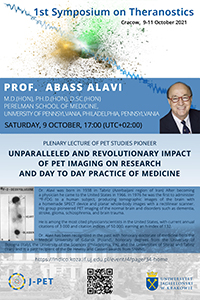 Abass Alavi (University of Pennsylvania, USA)
Abass Alavi (University of Pennsylvania, USA)
Abass Alavi, MD, a professor in the Department of Radiology at the Hospital of the University of Pennsylvania (Philadelphia), was awarded 2 honorary degrees from European universities in 2016. Each was presented in recognition of his contributions to molecular and structural imaging over the past 45 years. Both academic centers cited his many achievements in the field of PET as well as structural imaging with MR and CT, including groundbreaking studies in cardiovascular diseases, neurologic disorders, and inflammation, and publication of 1,000 articles in scholarly and high-impact journals.
He received an honorary doctorate of medicine from the Medical University of Gdańsk (Poland) at a ceremony hosted by Janusz Moryś, MD, PhD, the rector of the university. Dr. Moryś emphasized the far-reaching impact of Dr. Alavi’s contributions to PET imaging “without which today we cannot imagine a proper diagnosis of cancer.”
Dr. Alavi received an honorary doctor of medical sciences degree from the University of Southern Denmark (Odense). The award was part of a ceremony to celebrate the 50th anniversary of the founding of the university and was attended by Queen Margrethe II of Denmark. In making the award, presenters pointed to Dr. Alavi’s “outstanding contributions to nuclear medicine and clinical molecular imaging in particular and to the benefit of medicine and multiple patients all over the world,” as well as his “original thinking, willingness to share, and continued support to the specialty of Clinical Physiology and Nuclear Medicine in Odense and through that to many of our scientifically collaborating colleagues at Odense University Hospital and the University of Southern Denmark.” He was also praised for his mentorship and training of numerous physicians and scientists, many of whom are currently leaders in molecular imaging and related fields in the United States, Europe, South America, and Asia. Researchers at the University of Southern Denmark were particularly grateful for a recent and productive collaboration between their nuclear medicine department and Dr. Alavi’s laboratory at Penn, stating: “Dr. Alavi is a researcher of the highest international standard with personal qualities and a wish to inspire and share that puts him in a class by himself. With his unique background and education he possesses the characteristics and qualities of a true polymath. He has been and remains the driving force behind the spread of knowledge about and the application of this technology for the benefit of patients and society.”
Dr. Alavi was born in 1938 in Tabriz, a city in the Azerbaijani region of Iran. After becoming a physician he came to the United States in 1966 to study more advanced medicine in a science-based specialty. Together with chemists at Brookhaven National Laboratory (Upton, NY), Dr. Alavi, David Kuhl, MD, and Martin Reivich, MD, introduced radiolabelled glucose as 18F-FDG. Through this collaboration, Dr. Alavi in 1976 was the first to administer 18F-FDG to a human subject, producing tomographic images of the brain with a home-made SPECT device and planar whole-body images with a rectilinear scanner. His group pioneered PET imaging of the normal brain and disorders such as dementia, stroke, glioma, schizophrenia, and brain trauma. He also has been instrumental in advancing applications of 18F-FDG and other PET tracers in assessing numerous malignant and benign disorders. He is among the most cited physician/scientists in the United States, with current annual citations of 3,000 and citation indices of 50,000.
Dr. Alavi has been recognized in the past with honorary degrees from the University of Bologna (Italy), the University of the Sciences (Philadelphia, PA), and the Universities of Shiraz and Tabriz (Iran) and is a past recipient of the De Hevesy and Cassen awards from SNMMI.
